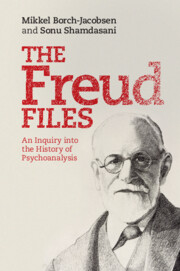1 - Privatising science
Published online by Cambridge University Press: 05 June 2012
Summary
I find that one of the greatest bonds between us is our feeling for science and for what science really means. I hardly think that Freud always had a completely clear grasp of that.
Ernest Jones to Marie Bonaparte, 2 July 1954Why do the current controversies revolve around the history of psychoanalysis and the manner in which it has been written? Why such vehemence on both sides, why a ‘war’? After all, the philosophical, epistemological and political critiques of psychoanalysis never aroused such passion. Psychoanalysis was reproached by Karl Jaspers for mixing up hermeneutic understanding (Verstehen) and the explanation (Erklären) of the natural sciences, by Jean-Paul Sartre for confounding repression and ‘bad faith’, by Ludwig Wittgenstein for confusing causes and reasons, by Karl Popper for avoiding all scientific falsification, by Adolf Grünbaum for proposing an epistemically inconsistent clinical validation and by Michel Foucault for producing sexuality under the cover of unmasking it. None of this affected psychoanalysts. Even the provocations and magnificent rhetorical violence of Gilles Deleuze and Felix Guattari’s Anti-Oedipus did not lead them to lose their composure. On the contrary, it is as if advocates of psychoanalysis were not perturbed by these debates because they legitimate their discipline, letting the adherents invariably escape unharmed, entrenched in the private sphere of the psychoanalytic clinic. The more Freud is debated, it is often said, the more it confirms his significance.
Why then such sudden susceptibility concerning historical details, some of which on first sight appear to be quite trivial? Why is it so important for psychoanalysts to maintain the version of events given by Freud and his authorised biographers? Is it simply a question of a dispute between experts, a controversy between historians such as we often see? Not in this case, because the dispute here is not simply one between factions of historians, or of ways of interpreting the historical record. More deeply, it pits historians against a radically dehistoricised version of psychoanalysis, disguised as a ‘history of psychoanalysis’. From this perspective, similarities abound between the ‘Freud wars’ and the ‘science wars’, which rage elsewhere between historians, sociologists and anthropologists of science on the one side and scientistic ideologues on the other. In both cases, what is at stake is the historicisation, and correspondingly the relativisation, of ‘facts’, ‘discoveries’ and ‘truths’ ordinarily presented as atemporal and universal and shielded from the variations and contingencies of history (it is of little importance here whether psychoanalysis styles itself as a science or not, as it still nevertheless presents itself as a universal theory, a general ontology valid for all). These debates are not external to the science or the theory, because they bear on this demarcation itself: can one or should one separate the science or the theory from its history? To take up the famous Mertonian distinction, can one separate what is ‘internal’ from what is ‘external’? Can one, as Reichenbach would have it, trace a limit between the context of discovery (the anecdotal account of the emergence of concepts) and the context of justification (the properly scientific work of proof)? It is the refusal of these demarcations by the new historians of science and of psychoanalysis which has generated such scandal, because it puts into question the pretensions of this or that discipline to scientificity and to theoretical hegemony.
- Type
- Chapter
- Information
- The Freud FilesAn Inquiry into the History of Psychoanalysis, pp. 30 - 115Publisher: Cambridge University PressPrint publication year: 2011



